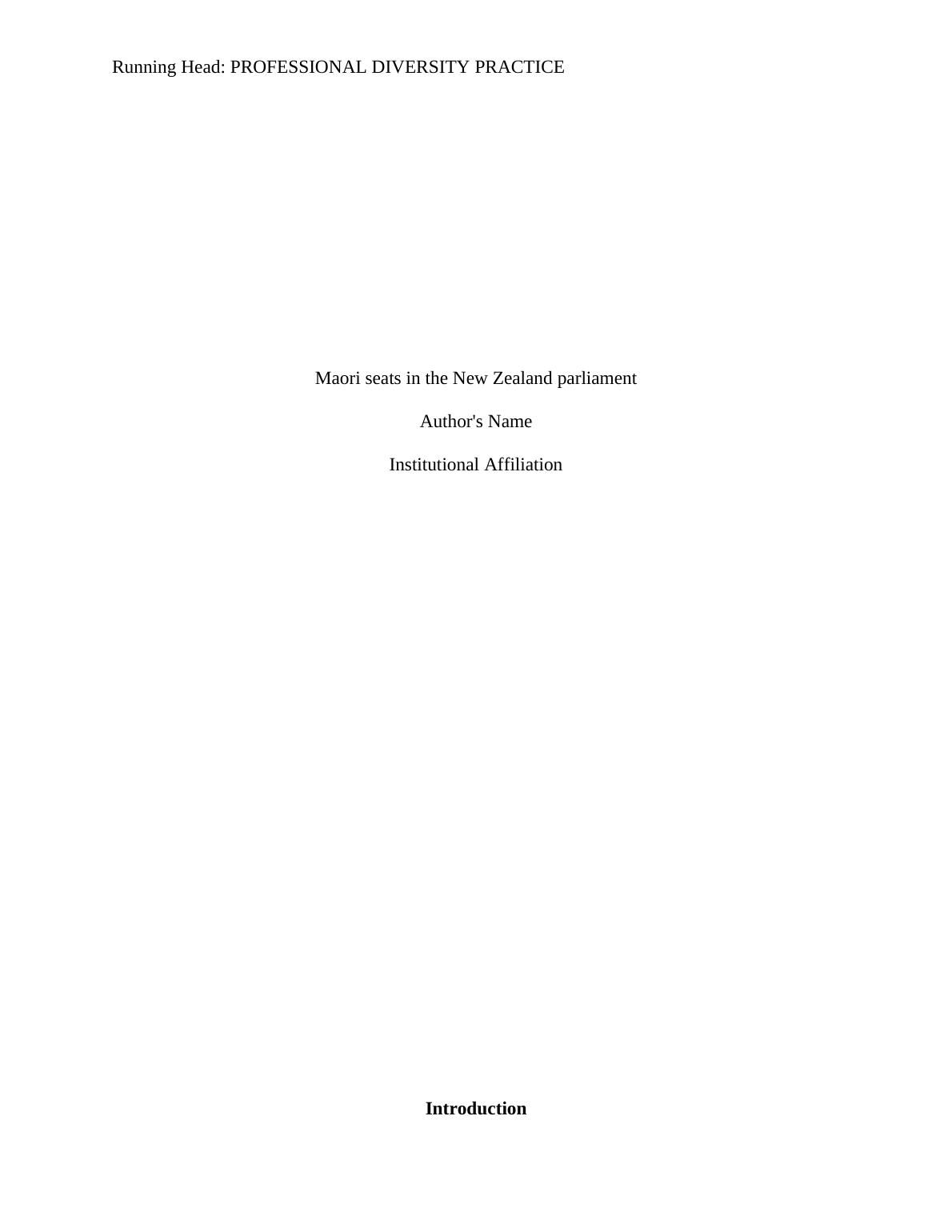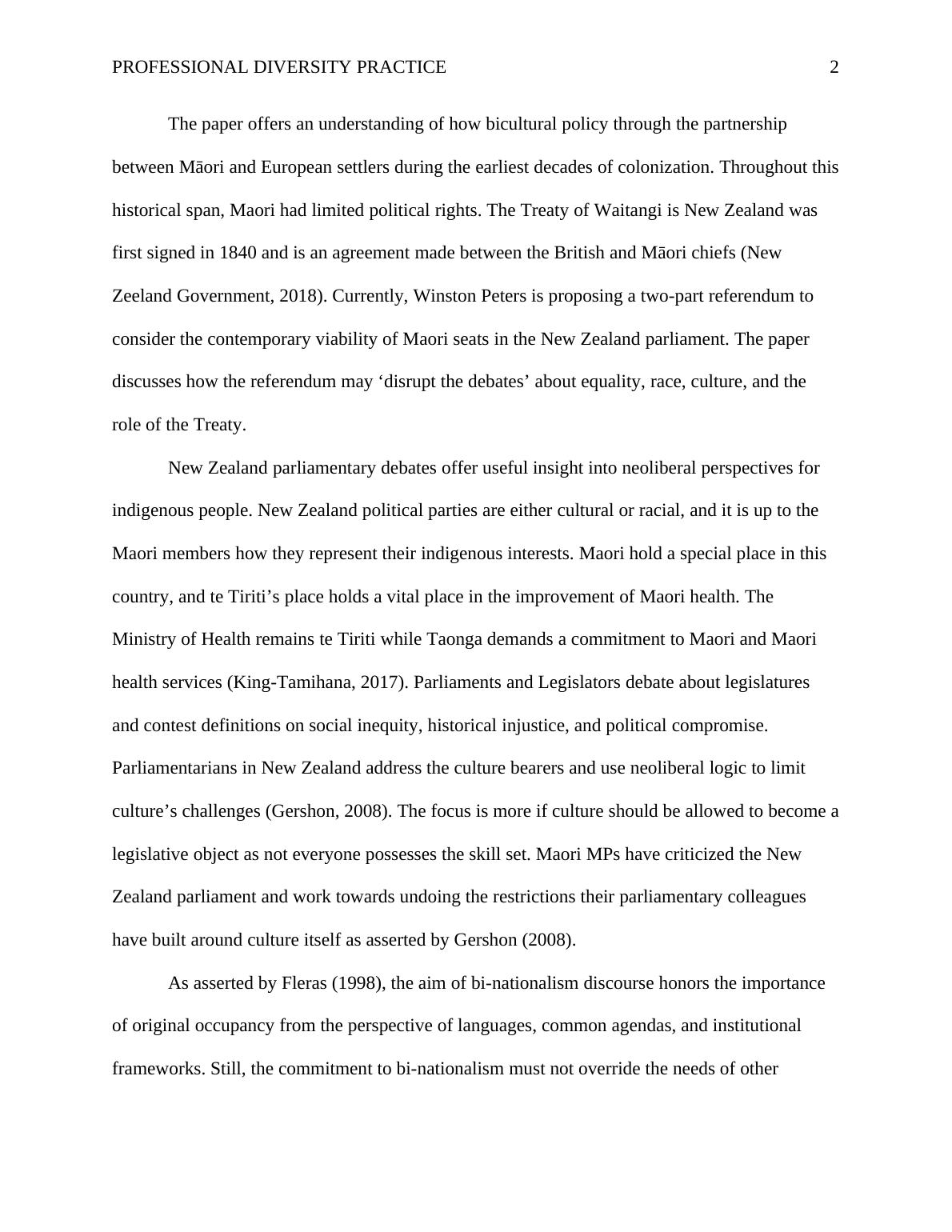Maori Seats in the New Zealand Parliament
Added on 2023-06-07
4 Pages826 Words452 Views
Running Head: PROFESSIONAL DIVERSITY PRACTICE
Maori seats in the New Zealand parliament
Author's Name
Institutional Affiliation
Introduction
Maori seats in the New Zealand parliament
Author's Name
Institutional Affiliation
Introduction

PROFESSIONAL DIVERSITY PRACTICE 2
The paper offers an understanding of how bicultural policy through the partnership
between Māori and European settlers during the earliest decades of colonization. Throughout this
historical span, Maori had limited political rights. The Treaty of Waitangi is New Zealand was
first signed in 1840 and is an agreement made between the British and Māori chiefs (New
Zeeland Government, 2018). Currently, Winston Peters is proposing a two-part referendum to
consider the contemporary viability of Maori seats in the New Zealand parliament. The paper
discusses how the referendum may ‘disrupt the debates’ about equality, race, culture, and the
role of the Treaty.
New Zealand parliamentary debates offer useful insight into neoliberal perspectives for
indigenous people. New Zealand political parties are either cultural or racial, and it is up to the
Maori members how they represent their indigenous interests. Maori hold a special place in this
country, and te Tiriti’s place holds a vital place in the improvement of Maori health. The
Ministry of Health remains te Tiriti while Taonga demands a commitment to Maori and Maori
health services (King-Tamihana, 2017). Parliaments and Legislators debate about legislatures
and contest definitions on social inequity, historical injustice, and political compromise.
Parliamentarians in New Zealand address the culture bearers and use neoliberal logic to limit
culture’s challenges (Gershon, 2008). The focus is more if culture should be allowed to become a
legislative object as not everyone possesses the skill set. Maori MPs have criticized the New
Zealand parliament and work towards undoing the restrictions their parliamentary colleagues
have built around culture itself as asserted by Gershon (2008).
As asserted by Fleras (1998), the aim of bi-nationalism discourse honors the importance
of original occupancy from the perspective of languages, common agendas, and institutional
frameworks. Still, the commitment to bi-nationalism must not override the needs of other
The paper offers an understanding of how bicultural policy through the partnership
between Māori and European settlers during the earliest decades of colonization. Throughout this
historical span, Maori had limited political rights. The Treaty of Waitangi is New Zealand was
first signed in 1840 and is an agreement made between the British and Māori chiefs (New
Zeeland Government, 2018). Currently, Winston Peters is proposing a two-part referendum to
consider the contemporary viability of Maori seats in the New Zealand parliament. The paper
discusses how the referendum may ‘disrupt the debates’ about equality, race, culture, and the
role of the Treaty.
New Zealand parliamentary debates offer useful insight into neoliberal perspectives for
indigenous people. New Zealand political parties are either cultural or racial, and it is up to the
Maori members how they represent their indigenous interests. Maori hold a special place in this
country, and te Tiriti’s place holds a vital place in the improvement of Maori health. The
Ministry of Health remains te Tiriti while Taonga demands a commitment to Maori and Maori
health services (King-Tamihana, 2017). Parliaments and Legislators debate about legislatures
and contest definitions on social inequity, historical injustice, and political compromise.
Parliamentarians in New Zealand address the culture bearers and use neoliberal logic to limit
culture’s challenges (Gershon, 2008). The focus is more if culture should be allowed to become a
legislative object as not everyone possesses the skill set. Maori MPs have criticized the New
Zealand parliament and work towards undoing the restrictions their parliamentary colleagues
have built around culture itself as asserted by Gershon (2008).
As asserted by Fleras (1998), the aim of bi-nationalism discourse honors the importance
of original occupancy from the perspective of languages, common agendas, and institutional
frameworks. Still, the commitment to bi-nationalism must not override the needs of other

End of preview
Want to access all the pages? Upload your documents or become a member.
